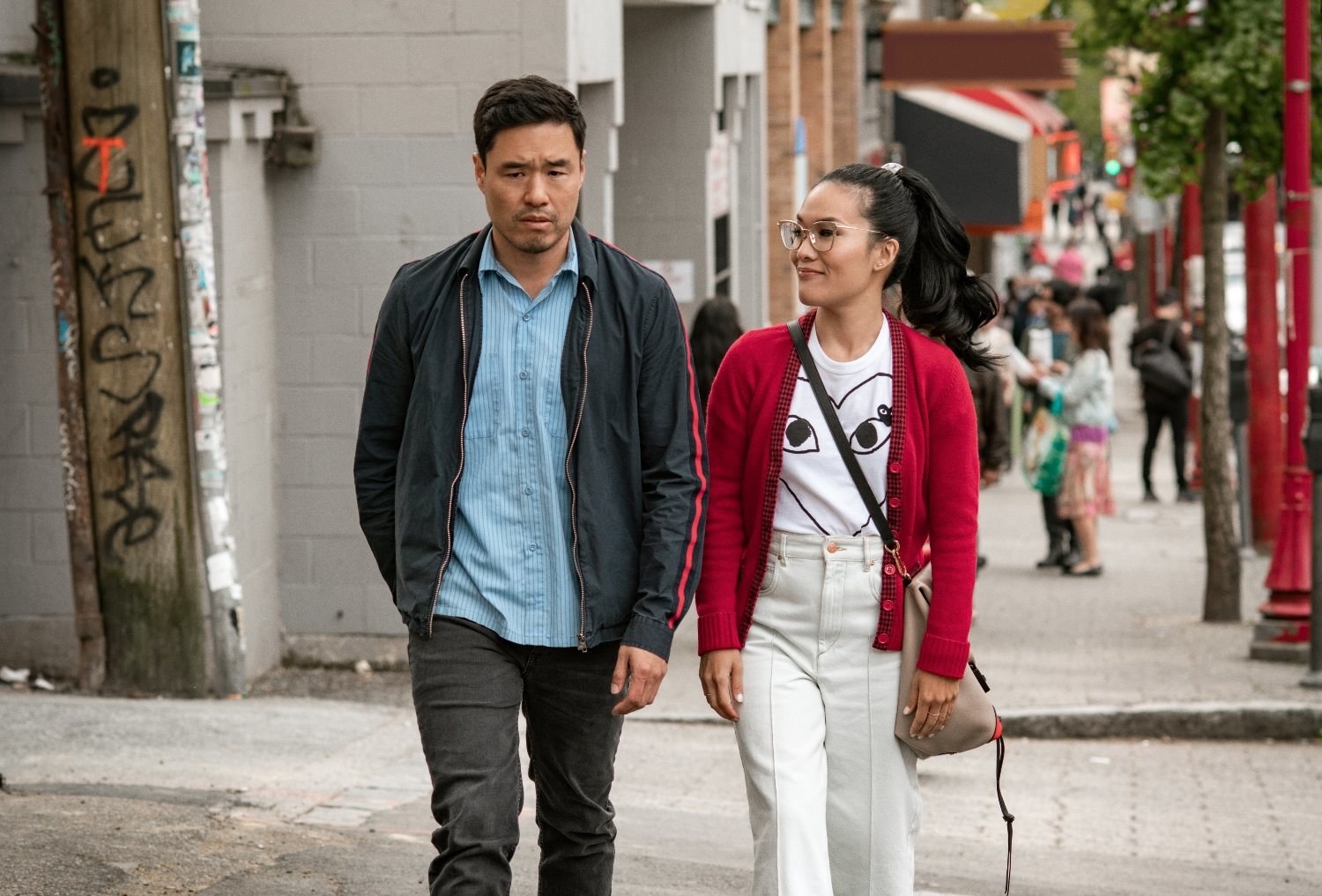
One thing that Marcus Kim, the HVAC technician and struggling rapper played by Randall Park in Always Be My Maybe, and Fred Flarsky, the unemployed alt-weekly journalist played by Seth Rogen in Long Shot, have in common is trouble dressing for the occasion.
Fred turns up at an exclusive cocktail party in a snapback and brightly colored windbreaker he passes off as dressy because it zips all the way up. Later, caught without anything appropriate to wear to a state dinner, he’s given a traditional Swedish suit, knee breeches and all, a prank that makes him look like he’s participating in an obscure form of cosplay.
When Marcus gets invited to a high-end dinner, he busts out a timeworn tux that could be a holdover from his high school prom, only to end up the lone figure in black tie in a restaurant otherwise full of designer T-shirts. So he wears a T-shirt himself to the next occasion, only to discover that he’s not allowed to enter without a jacket. He’s loaned one that’s much too big, leaving him looking like a child dressed in his father's clothing. It's an observation that could apply to both of these characters, who may be well into their thirties, but who seem to find the adult world to be semi-foreign territory.
Call these guys the rom-com schlubs — not man-children, exactly, but not fully developed grown-ups either, much less hunky heartthrobs ready to sweep their leading lady off her feet. Over the decades, romantic comedy men have been fast-talking charmers, sweetly hapless stammerers, jerks with soft centers, boombox-wielding dreamers, wry urbanites, and regular old nice guys, but it’s hard to think of a time when they’ve been presented as so pointedly less than as in these two movies. Fred and Marcus stand in stark contrast to the powerhouse women they love, and who, to the men’s astonishment, turn out to love them back. Marcus wins the heart of Sasha Tran (Ali Wong), who grew up next door to him in San Francisco, and who’s become a celebrity chef building out an empire of restaurants around the country, while Fred dates Secretary of State Charlotte Field (Charlize Theron), who was once his babysitter and is now ramping up a presidential run.
It’s easy to see how these films could be interpreted as male wish fulfillment fantasies about characters who are inexplicably liked by women even as the men don’t seem to have much to offer. Long Shot, in particular, sometimes brings to mind the 2007 Judd Apatow movie Knocked Up, in which Katherine Heigl appears to stay with Rogen out of...general resignation? But because they focus instead on the desires and frustrations of their driven women, they play out as something different — opening up the conventions and expectations of the rom-com, and, in particular, what romance looks like when it’s the woman who has all the capital.
They may not radically upend the genre’s gender dynamics — when Fred’s best friend describes Charlotte and Fred’s relationship as “Pretty Woman, but she’s Richard Gere and you’re Julia Roberts,” he’s leaving a whole bunch of inconvenient elements out of the comparison — but they suggest a new frontier for the rom-com lead as someone whose swooniest quality might just be his willingness to be supportive.
The rom-com schlub is neither the hottest nor the most powerful guy in the room — Rogen’s character fumes in the shadow of a romantically available, fitfully smooth variation on Canadian Prime Minister Justin Trudeau (Alexander Skarsgård), while Marcus’s rival is first a high-flying restaurateur played by Daniel Dae Kim, and then no less than Keanu Reeves as an outlandish version of himself. But that’s part of the schlub’s appeal — he’s not someone who looks at a relationship as a strategic, mutually advantageous melding of compatible brands.

Sasha, at one point in Always Be My Maybe, refers to Marcus as “a regular guy,” and he’s hurt, not realizing that she sees it as a good thing. Meanwhile, Charlotte, describing her sparse dating life, sighs, “Who wants to follow me around the world and hope I have five minutes to be affectionate?” while Fred looks on with hearts in his eyes, ready to sign up. It’s not an accident that Marcus and Fred go way back with their respective love interests. It explains how characters inhabiting such different orbits would meet, but it also suggests that Sasha and Charlotte like having found someone who knew them as a person first, not a star.
Rogen, as his recent GQ spread reinforced, and Park, with his crinkly-eyed dad allure, are both stealth smokeshows, and their characters are funny and disarming and entirely plausible as objects of affection. Despite what the incels tell themselves, love is not a mathematical competition that the possessor of the most sharply angled jawline or the biggest bank account will always win. But rom-coms have tended to abide by conflicted, sometimes regressive ideas about masculinity themselves (consider whatever Gerard Butler was doing in The Ugly Truth), and these two films feel like they’re trying, however imperfectly, to pry the genre away from that. The idea that the voting public would react badly to seeing Charlotte with someone they perceive to be below her actually becomes a plot point in Long Shot, though Charlotte also observes that “guys don’t really want to date women who are more powerful than them.” Her desires don’t seem to figure into the discussion at all.
The big question in both Long Shot and Always Be My Maybe is not why Charlotte and Sasha enjoy spending time in the company of these men — these men make them happy — but whether these men, accustomed to setting the (often limiting) terms of their own lives for so long, will be able to handle compromising and fitting themselves around the bigger ambitions of the women they want to be with. “I don’t need you to live my life, but I need you to understand that this is my life,” Sasha says to Marcus when she tells him she loves him, but she’s not going to put everything on hold to accommodate his comfort zone. “After the opening, I’m going to go to New York, and if you don’t want to come with me, then just say it.”
The alleged death of the mainstream romantic comedy, and its subsequent Netflix- and Crazy Rich Asians–enabled reemergence, has been the subject of a lot of analysis and not a little dispute. Wesley Morris, pining for the Katherine Heigl heyday in the pages of the New York Times, speculated that one of the reasons the genre fell out of favor is the rising sentiment that there’s something inherently retrograde about romance when it comes to empowered women characters. (Consider the crowdfunding campaign to get girls to see Captain Marvel that, weirdly, touted the superhero’s role-model worth by pointing out how “unlike many female characters, her story doesn’t rely on romance and other typical woman character arcs.”)

“Dreaming up a modern romantic-comedy plot that works — one that wouldn’t send the wrong message or feel too unrealistic or too old-fashioned — seems risky,” Morris mused, and while I’m not convinced it’s actually all that hard to manage, you can see a lot of the entries in that last wave of rom-coms fighting with their own formulas, as though they’re aware that feminism can work perfectly well with a compelling love story, but are unable to fully commit to the concept.
Rom-coms have always involved an element of escapism, from their eternally unrealistic workplaces to those improbably gorgeous (and apparently controversial?) Nancy Meyers kitchens. Fantasy doesn’t have to be backward-looking, but it does tend to bring a lot of internalized baggage to the table, especially regarding the idea that a woman is cold or just tragically incomplete until she’s in a relationship. Reviewing a certain Sandra Bullock–Ryan Reynolds vehicle in 2009, Manohla Dargis noted how often the genre seemed to feel the need to humiliate its women leads, as though love were something for them to be cowed into — “Like most Hollywood romantic comedies these days, The Proposal is all about bringing a woman to her knees.”
One of the most infuriating habits of the rom-com has been the way it’s leaned on careerism as the most convenient obstacle when it comes to keeping two lovers apart, leading more than one heroine to have to learn to quit being so committed, or to quit, period, because her job is preventing her from finding the contentment that apparently only romance can bring. But there’s never a moment in either Long Shot or Always Be My Maybe in which the women protagonists seriously consider scaling back on their work. Their ambitions and the amount of time they’ve devoted to them aren’t diminished or revealed to be empty prizes they start to regret.
Neither movie — Long Shot was written by Liz Hannah and Dan Sterling, Always Be My Maybe by Park, Wong, and Michael Golamco — can resist letting the men leads get a few righteous digs in. In Long Shot, Charlotte takes a lesson from Fred about when to speak truth to power, and in Always Be My Maybe, Sasha gets reductively schooled by Marcus about authenticity in Asian cuisine. But the final acts both turn on the same axis — it’s not how Charlotte or Sasha will get cut down to size, but whether Fred and Marcus will really be able to conceive of a relationship in which they play the supporting role.
Long Shot and Always Be My Maybe aren’t gritty, grounded romances that aim to undermine formula in favor of realism. They’re still of the glossy variety — they just offer up a different sort of fantasy, one that diverges from dashing princes or strapping dreamboats with hearts of gold beneath their gruff exteriors. These movies are sometimes stilted and sometimes deeply satisfying reveries about love and work not existing in opposition, and in which women can have it all, in part because the men in their lives are willing to support them in achieving it.
Long Shot ends with Fred taking Charlotte’s last name after they wed, and Always Be My Maybe with Marcus asking Sasha if he can hold her purse. If these developments are both tremendously on the nose, well, when has this genre ever not suffered from a touch of corniness? It’s just nice to see that corniness deployed in favor of something that feels like it’s earnestly in search of the new — a reminder that, when it comes to the rom-com, there’s still a lot of territory to be explored. ●
